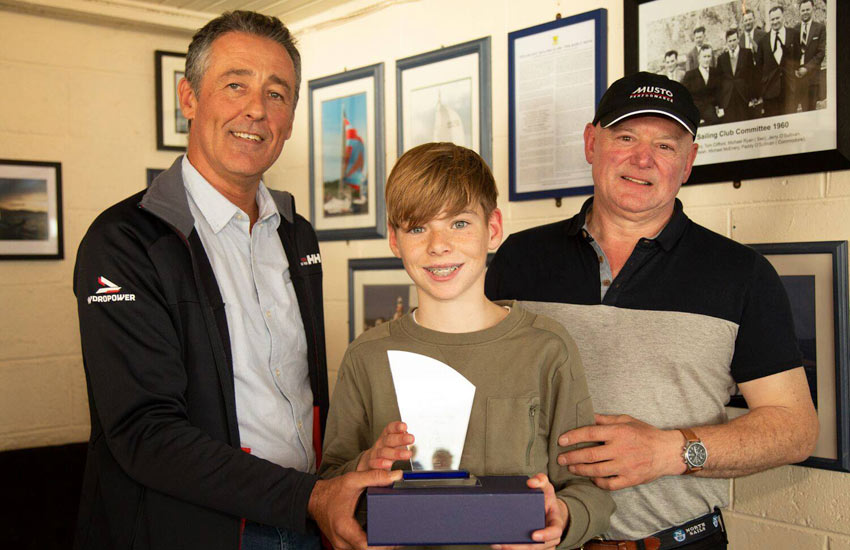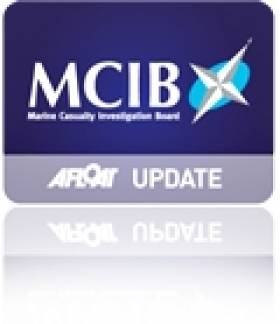Displaying items by tag: Johnny Flynn
Howth Sailors Top 2018 Oppy Rankings After Strong Season Finish On Tralee Bay
#Optimist - Howth Yacht Club have congratulated youth members Luke Turvey and Rocco Wright for topping the senior and junior tables respectively in the final 2018 rankings in Ireland’s Optimist class.
Turvey is in fine company in the senior fleet, ahead of Justin Lucas; James Dwyer-Matthews; Rian Geraghty-McDonnell, Ireland’s top performer at last week’s Oppy Worlds in Cyprus; and Sam Ledoux, who beat him on count back to win the senior Gold fleet at the IODAI Munster Championships last weekend.
Fellow Howth and NYC youth Wright, meanwhile, sailed a solid event with five bullets at Tralee Bay Sailing Club in Fenit, which saw a tough weekend of shifty conditions.
And in another win for Howth, the Fair Sailing Award went to Johnny Flynn.
 Luke Turvey was second overall in the Senior fleet | Photo: Paul-Michel Ledoux
Luke Turvey was second overall in the Senior fleet | Photo: Paul-Michel Ledoux
2018 IODAI Munster Championships Results
Junior Fleet Gold
- 1st Rocco Wright HYC
- 2nd Jessica Riordan RStGYC
- 3rd Ben O’Shaughnessy RCYC
- 4th Billy Doyle TBSC
- 5th Peter Williams RStGYC
Junior Fleet Girls
- 1st Jessica Riordan RStGYC
- 2nd Alana Twomey RCYC/CHSC
- 3rd Clementine van Steenberge NYC
Junior Fleet Silver
- 1st Sorcha Gannon O’Connor HYC
- 2nd William Walsh TBSC
- 3rd Conall Mac Thrinfhir TBSC
- 4th Harry Moynan RCYC
- 5th Hugo Crawford HYC
Top Local Sailor – Junior Fleet
- Billy Doyle TBSC
Senior Fleet Gold
- 1st Sam Ledoux NYC
- 2nd Luke Turvey HYC
- 3rd James Dwyer Matthews RCYC
- 4th Fiachra McDonnell NYC
- 5th Trevor Bolger RStGYC
Senior Fleet Girls
- 1st Eimer McMorrow-Moriarty TBSC
- 2nd Lauren O’Callaghan NYC
- 3rd Grace Fahy RStGYC/LDYC
Senior Fleet Silver
- 1st Liam Duggan RCYC
- 2nd Fleet Ciara Paul MYC
- 3rd Clodagh Malone NYC
Top Local Sailor – Senior Fleet
- Eimer McMorrow-Moriarty TBSC
Fisherman Drowned 100 Metres From Shallows Says MCIB Report
#MCIB - Various factors - including poor buoyancy, suboptimal lifejackets and a fateful late decision to swim to shore - have been identified in the official report into the death of a fisherman off the Waterford coast earlier this year.
As previously reported on Afloat.ie, a major search and rescue operation was launched on 10 January when a 16-foot fishing punt capsized in a strong swell at the sandbar off Brownstown Head near Dunmore East, throwing its two-man crew overboard.
James Tate was able to swim to the nearby shore in the early morning darkness after some two hours in the water. But he became separated from his friend Johnny Flynn - a former member of the Dunmore East lifeboat crew - who was found unconscious in the water by coastguard helicopter before 8.30am.
Flynn was pronounced dead at Waterford Airport shortly after, with a post-mortem concluding that he cause of death was drowning.
The tragedy occurred six years to the day after the sinking of Dunmore East trawler the Pere Charles, which took five lives.
In the official report into the incident, the Marine Casualty Investigation Board (MCIB) found that the fishing punt, already vulnerable to breaking waves as an un-decked open boat, was more susceptible due to its waterlogged condition, and the lack of adequate buoyancy.
It was also found that neither the vessel's handheld VHF radio nor GPS device, or indeed Tate's mobile phone, were available to the pair after the boat turned turtle.
Though both men were wearing lifejackets, they were of a kind that lacked a collar that would have kept the deceased's head above water, nor did they have a light or whistle. Only Tate was equipped with any kind of light, so he could not locate his friend in the dark.
Most importantly, it was found that the boat had overturned within 100 metres of the shallows, so that if the pair had attempted to swim to shore earlier - rather than tire themselves out trying to climb onto the upturned hull - the chances of both men surviving the incident "would have been greatly enhanced".
The full report into the incident is available to download below.






























































